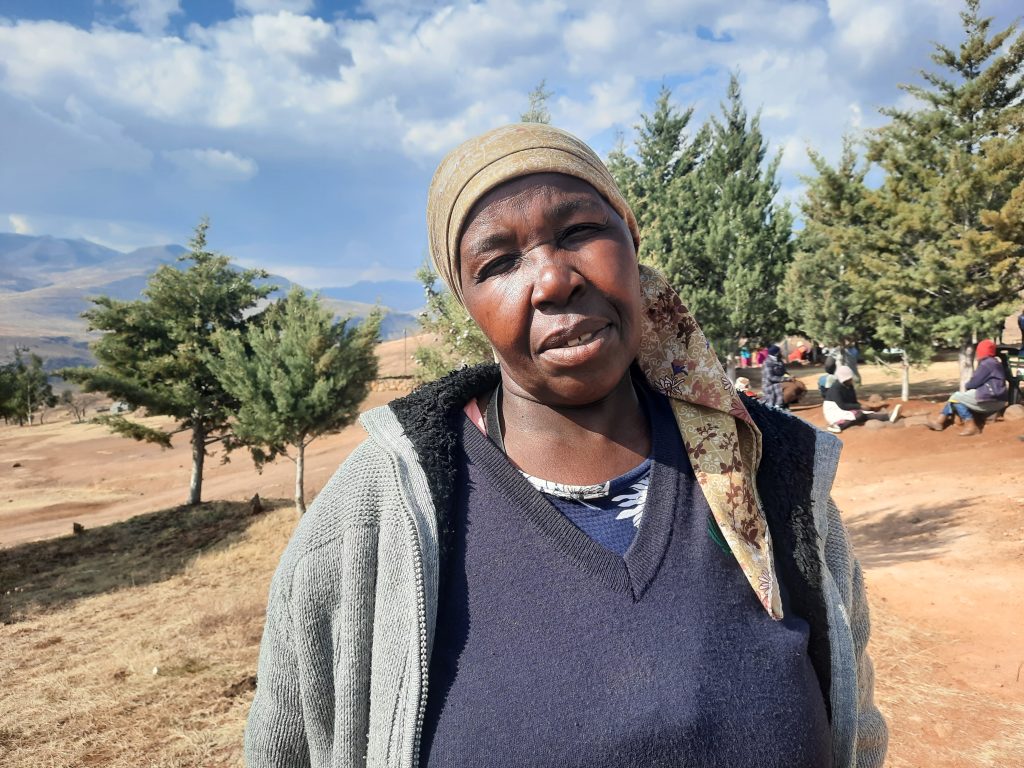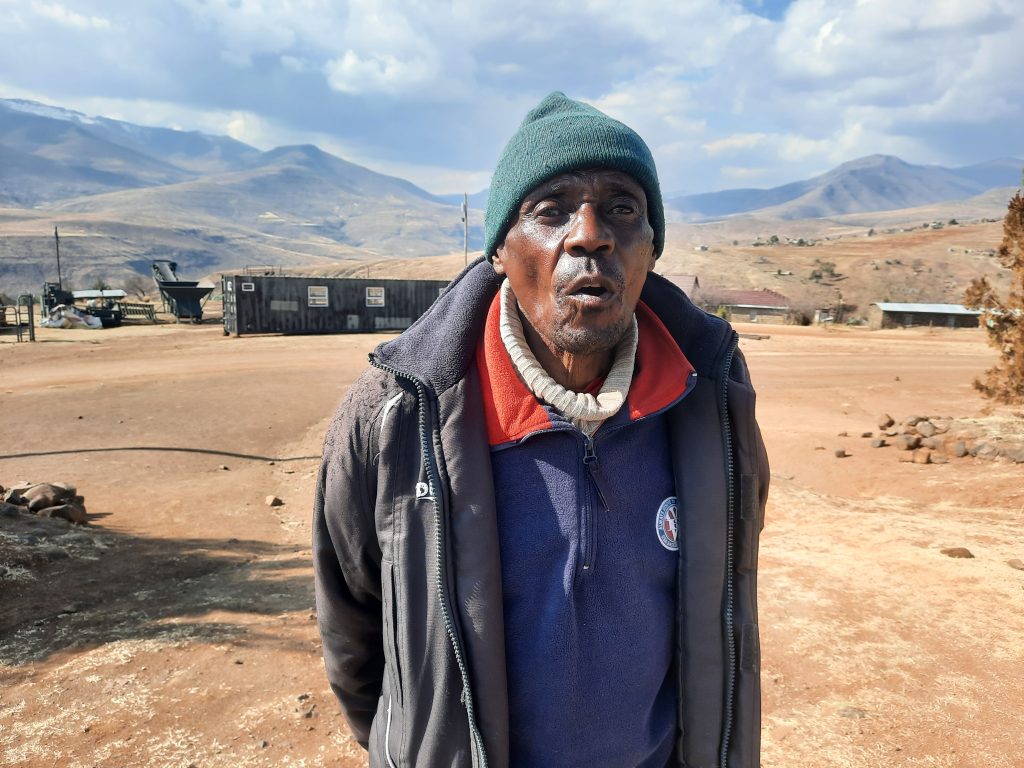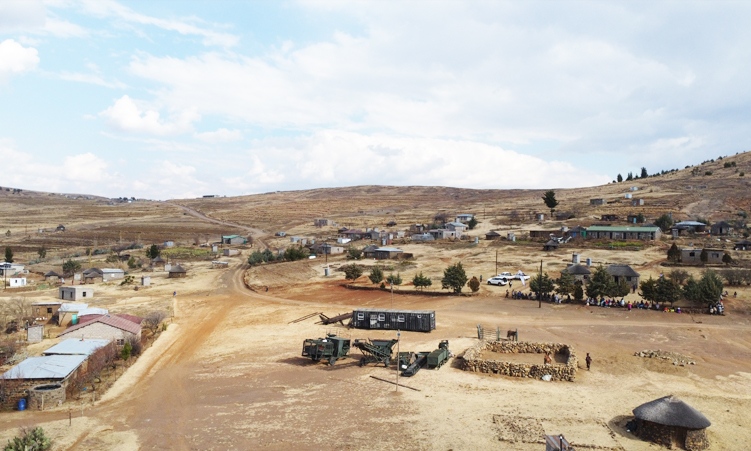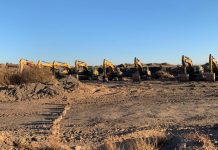By Sechaba Mokhethi and Mamello Mochesane | 16 September 2025
In Lesotho’s remote highlands, 46 villagers are preparing a legal fight to stop a diamond prospecting project that could cost them their land, livelihoods and way of life. But, considering that the prospecting license has been granted to a company linked to one of Lesotho’s most powerful families, the odds could be stacked against them.
In 2022 a Lesotho Defence Force (LDF) helicopter touched down in Mashai, Thaba-Tseka. Setungoane Letsoela, wife of LDF Commander Lieutenant General Mojalefa Letsoela, alighted and asked the village for their blessing on Alluvial Terraces Pty Ltd proposal to explore the Senqu Riverbed nearby for diamonds.
The river lies behind the village, beyond a mountain and fields. With no map detailing the scope of the prospecting or future mine and no talk of compensation, villagers agreed, believing the project would not touch their homes or farmland.
Only after Alluvial Terraces Pty Ltd secured its two-year prospecting licence in October 2023, did the villagers see the full map of the prospecting area which had grown far beyond the Senqu Riverbed —now reaching into their crop fields, grazing lands, and even the communal sports grounds.
“She told us she would only be working in the river,” said Palamang Jane, a resident of Mashai. “We were concerned about our livestock, and we were assured there would be no impact. But now we see our fields marked out, our grazing areas gone, and we never agreed to that.”
In an interview with MNN, Setungoane Letsoela admitted that the initial plan was to mine in the river. However, when the approved coordinates arrived, they covered the fields and the entire village of Mashai. MNN understands that villagers were unaware that the map also included their homes.

Having received the coordinates, Letsoela said they went back to the communities to seek their approval of the new demarcations. “That was when some refused with their fields, while others agreed,” she told MNN. Villagers who have refused feel misled—lured into initial support under false pretences—only to be met with unilateral changes after the company obtained a two-year diamond prospecting licence from the Ministry of Natural Resources. A letter from then Acting Commissioner of Mines, Mohato Moima, confirms the licence was granted to Alluvial Terraces “owned by Setungoane Letsoela”.
However, Letsoela told MNN she is only a chief executive for Alluvial Terraces, which is co-owned by South Africa-based Beatus Ventures and the local partner, Khangline. “Beatus wanted to leave due to Mashai issues, but we managed to negotiate them to stay,” she said.
Alluvial Terrace’s environmental consultant, Rethabile Khoete, told MNN that they only received environmental clearance after returning to the communities and explaining how the new demarcations would affect them. Khoete said they assured the villagers that “no one’s field will be taken, but only samples will be collected first to prove the existence of diamonds, while they continue to use their fields.”
However, Chief Karabo Lerotholi and his villagers said it was only after the deal was sealed that the mining company presented a map showing demarcations extending far beyond the river, encroaching on community fields, football grounds, and even horse racing tracks.
“When the map arrived, it showed that the boundaries had extended far beyond what was initially agreed,” said Chief Lerotholi. “I told her this [demarcation change] was beyond my authority, because our Principal Chief only approved mining in the river.”
The stand-off with the community has delayed any prospecting which was supposed to be limited to the two years between 17 October 2023 and October 2025.
Letsoela told MNN that due to these misunderstandings, the company has not yet begun prospecting activities, as they want to ensure everyone is aligned. She added that, despite the licence expiring in three months, they are ready to apply for a one-year extension.
When asked about what compensation the villagers were being offered under the expanded scope of the prospecting work, Letsoela said it was premature to discuss compensation issues with the fields or house owners until prospecting activities were done to prove diamond existence. But she said that she has committed to providing drinking water supply, building another sports ground and pre-school for Mashai community.
Forty-six villagers have turned to the Seinoli Legal Centre for help in challenging a diamond prospecting project they say threatens their land and livelihoods. The public interest NGO, which supports communities affected by large-scale developments, is now investigating the case.
Human rights lawyer Adv. Lepeli Moeketsi says Lesotho’s Land Act of 2010 gives affected individuals and communities the right to object to expropriation and appeal to the Land Court. While the law requires prior notice and market-value compensation, it rarely accounts for the cultural, social, and economic disruption such projects cause in rural areas.
International treaties binding on Lesotho—including the UN Declaration on the Right to Development, the African Charter on Human and Peoples’ Rights, and the International Covenant on Economic, Social and Cultural Rights—also protect rights to property, culture, and livelihood. These agreements require that development be based on meaningful community participation, fairness, and equitable sharing of benefits.
On these grounds, Moeketsi says, the villagers have a clear legal right to object.

Villagers’ fears
Adding to the villagers’ fear was not just the sudden change, but the way they say it was delivered. Letsoela is said to have repeatedly landed in Mashai by military helicopter, accompanied by a woman believed to be a soldier acting as her bodyguard.
“When she introduced the map to us during a village gathering, she said she was not going to answer any questions. It was like our views didn’t matter,” one of the villagers, Kutloano Bolae told MNN in an interview.
For many villagers who spoke to MNN in Mashai, their engagement with Letsoela felt less like a negotiation with a private company and more like an encounter with state power, “yet it is our own livelihoods that are being trampled upon.” “We were intimidated,” said ‘Mamalefetsane Letatana of Thepung village. “It’s one thing to learn she is the LDF commander’s wife. But to always show up in an army chopper? It felt like we were being threatened,” emphasised Letatana.
LDF spokesperson Colonel Sakeng Lekola told MNN that the LDF helicopter can be used by any Mosotho who follows the procedure to hire the aircraft, “ ‘M’e [Letsoela] included.” However, he said he could not confirm if she hired it because: “I do not keep records of all people who hired it.”
Chief Lerotholi also insisted that none of his subjects was intimidated by the LDF helicopter, claiming it was common in Mashai for ordinary people to use it. “Yes, the helicopter was labelled LDF, but many people living here are illiterate. They can see a helicopter but cannot identify whether it belongs to the LDF or not.”
Responding to these allegations, Letsoela said since she started going to Mashai in 2022, she has been chartering a military helicopter and paying for it, as that is a more efficient option for her. She said a road trip to Mashai took three days and was more expensive, including lodging costs. “Anyone can hire the military chopper,” she said, adding that it’s only been in a few incidents where they drove due to bad weather for the helicopter.
“Yes, I have a bodyguard, and whenever I go to any crowded places, I go with her. She always sits on the visitors’ bench, and this was only picked up by one of the villagers who is a retired soldier. Otherwise, there is nothing else notable about her,” Letsoela added.
“I have also heard rumours that they say I am silly because I am a soldier’s wife. There is nowhere that soldier comes into these issues. I fight my own battles. There is never a case where Ntate Letsoela picks up the phone and calls anyone to fight my battles. It is so unfortunate that he is being dragged into this,” she insisted.
Letsoela also said she didn’t understand how villagers could be intimidated by a helicopter, yet some of them asked for a lift, and one villager even requested help transporting a deceased body by chopper.

Divisions
Anger is also growing among the Mashai community, as villagers who refuse to relinquish their fields to the mine accuse their local chief, Chief Lerotholi, of turning against his own people and supporting the mine.
“This has created fear and division among villagers because some agreed to relinquish their fields, while Chief Lerotholi opposes those who refused to give up theirs,” said Bolae. He explained that initially, Chief Lerotholi supported his people, but his stance changed after the map was presented.
Letatana stated that those who refused to give up their fields requested a meeting with the chief to voice their concerns, “but he expelled us, accusing us of dividing the village.” She added that they went to another place, where they wrote a letter to the principal chief and other authorities, but Chief Lerotholi refused to endorse it with his stamp.
In an interview with MNN, Chief Lerotholi said he could “not stamp a letter I had not read and did not know its origin.” He stated that more villagers agreed to relinquish their fields than those who did not, “who are just six”. “I am working well with both groups, but those opposing the mine are rebellious and hold secret meetings without my knowledge.”
According to Letatana, the mine proceeded to “mark our fields with poles without our consent. We raised concerns again, showing we had not agreed to anything, but it was claimed that only the fields of those who had consented were marked; however, many of us never gave our approval.”
On marking fields whose owners had not granted permission, Letsoela said she acted under the principal chief’s instruction. “We were given approval by Chief Mojela Makhaola to do the markings so that it became clear which fields are affected,” she said. But Chief Makhaola denies this.
Speaking to MNN, Chief Makhaola said, “It is not true that I gave the mine permission. I never gave such instructions.” “How could I give them permission on people’s property?” he added. “What the mine is doing to the livelihoods of the rural people, most of whom are unemployed, is wrong,” he said, concluding, “My final word is this mine should leave this place and find another one.”
This story was produced by the MNN Centre for Investigative Journalism and syndicated by the IJ Hub on behalf of its member centre network in Southern Africa.







